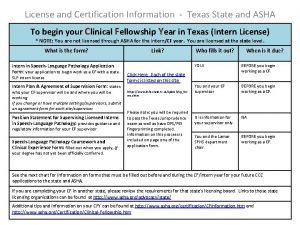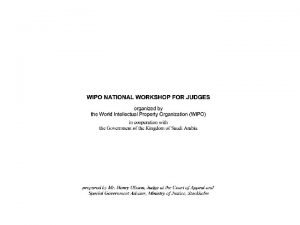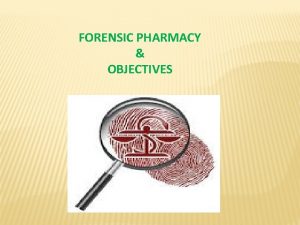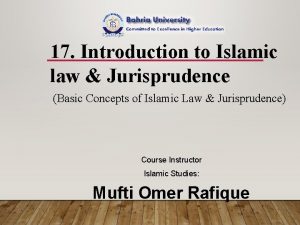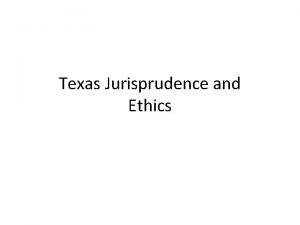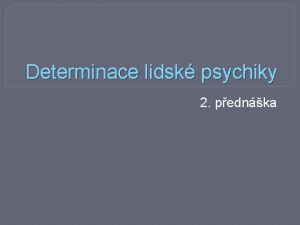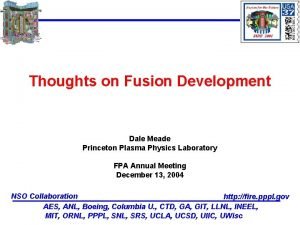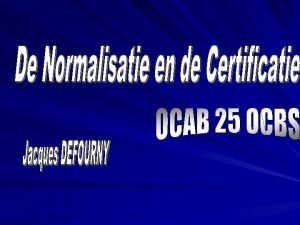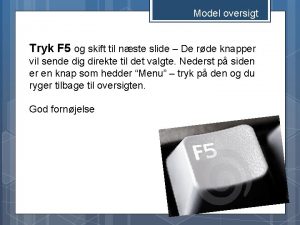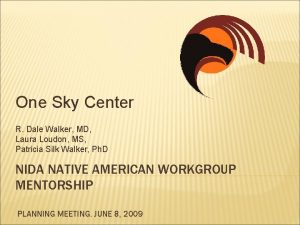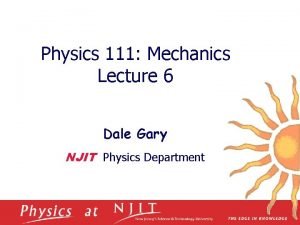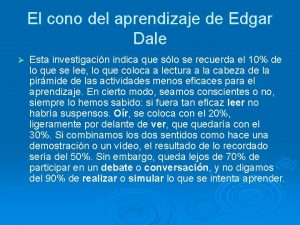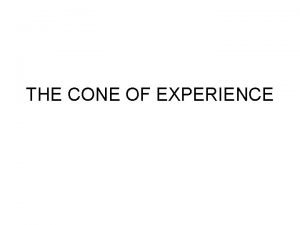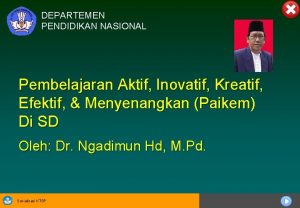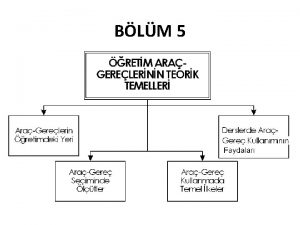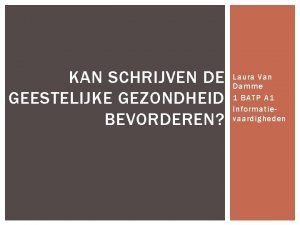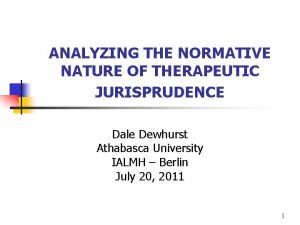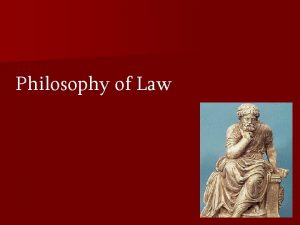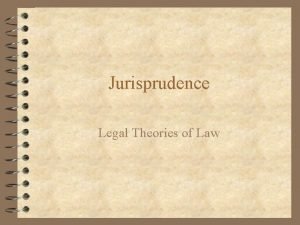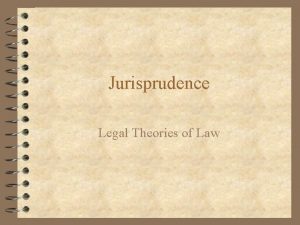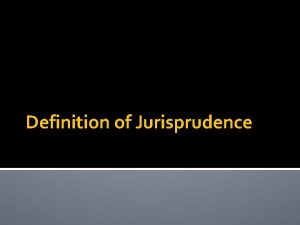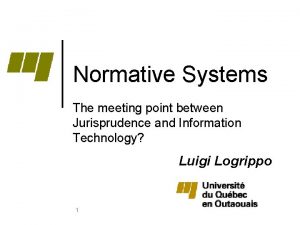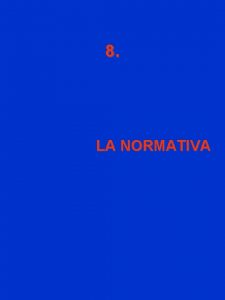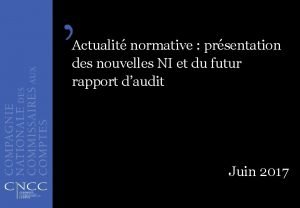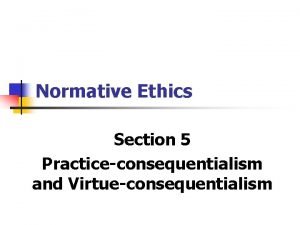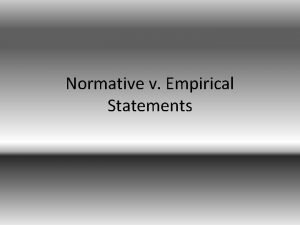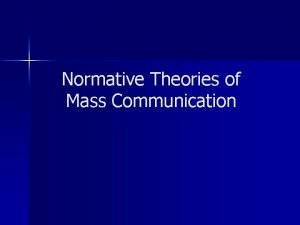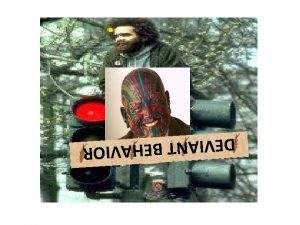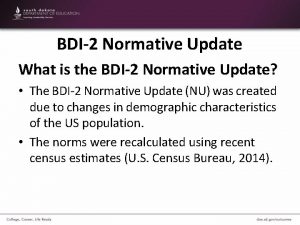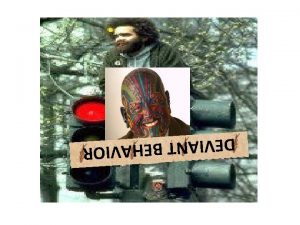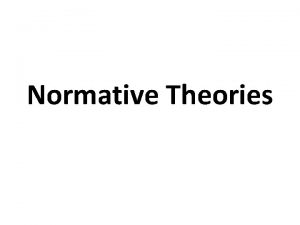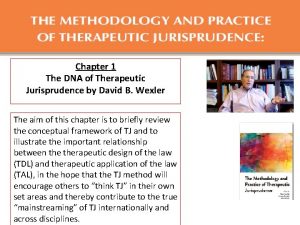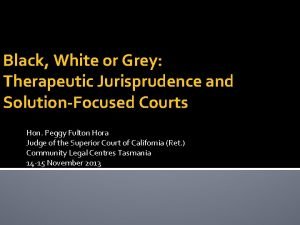ANALYZING THE NORMATIVE NATURE OF THERAPEUTIC JURISPRUDENCE Dale

























- Slides: 25

ANALYZING THE NORMATIVE NATURE OF THERAPEUTIC JURISPRUDENCE Dale Dewhurst Athabasca University IALMH – Berlin July 20, 2011 1

Introduction n Recent writings have debated TJ’s normative nature: TJ is a lens. It is not constrained by a particular normative theory. It is a dominant legal paradigm, fully normative and capable of reinventing law and justice systems. It is without normative value as it violates: zealous representation; effective assistance of counsel; due process; individual rights. Wexler, Winick Kress n Satin n Quinn 2

Argument n n A number of these arguments lack clarity, suffer from category mistakes, or proceed upon unsound reasoning. Distinguishing between three different normative levels is necessary to clarify these arguments. Dewhurst TJ should then make strong normative claims but limited to the levels of legal practice and legal theory. Rejection of normative status at the level of the legal order is critical for TJ to remain respectful of people’s individual and cultural values. 3

Level 1 – Legal Practice n n This is the level akin to applied ethics. Focus upon current laws and ethical codes, identify relevant facts, apply them to the facts. Dewhurst Analyze specific controversial practices in keeping with existing ethical/legal frameworks. Analysis is primarily procedural and the existing ethical/legal system is taken as given. 4

Level 2 – Legal Theory n n This is the level akin to normative/theoretical ethics. Identify gaps/holes in current ethical/legal frameworks; propose solutions to fill holes, address new values, clarify the spirit of the ethical/legal frameworks. Dewhurst Risk of analysis being unduly limited by existing practices and traditions. Dewhurst Analysis becomes more substantive and existing ethical/legal systems are challenged on their ability to meet higher level 3 core values. 5

Level 3 – Legal Order n n This is the level akin to meta-ethics. Study law and justice as universal concepts; “goods” with inherent value provide measurement criteria for legal theory and legal practice. Aristotle, Dewhurst, Gewirth. Assess how level 2 ethical/legal frameworks must be designed to attain our deepest values Toulmin, Gewirth. Analysis is more idealized and provides the foundation, justification and measure of the success of ethical/legal systems at levels 1 and 2. 6

Level Summary n n n Level 3 - Legal Order sets the overall purpose of law with regard to overarching norms of justice. Level 2 - Legal Theory develops systems that are believed to be appropriate for achieving the goals of the legal order. Level 1 - Legal Practice develops mechanisms to implement the directives of legal theory in particular conflict situations. 7

Level 1 -2 Arguments n n n Clients come to lawyers with a range of problems, only some legal, not all adversarial – must involve more than legal analysis alone Silver. Professional/human relations training required in law school – implies level 2. Interviewing and counseling skills required Watson, Binder & Price – implies additional level 1 & 2 skills beyond legalistic adversarial skills. 8

Level 1 -2 Arguments n n n TJ looks to whether law can be made (level 2) or applied (level 1) in a more therapeutic way. TJ lens enables analysis of legal rules on therapeutic outcomes (level 2); and design of procedures (level 1) Hora. TJ focuses on healthy emotional life and psychological well-being Wexler – but doesn’t define these values; this must be left to level 3. 9

Level 1 -2 Arguments n n TJ studies the role of law as a therapeutic agent Freckelton, Winick, Wexler; analysis useful for level 2 law reform Wexler, Winick. TJ doesn’t trump other considerations, not paternalistic or coercive Wexler, Winick, Hora – not level 3. Demand for distinctive definition of TJ and “therapeutic” Petrila, Slobogian is misplaced at level 2. Inappropriate to tightly define “therapeutic” Wexler; which must rely on level 3 values. 10

Level 1 -2 Arguments n n n Instead, ask hard questions about effects of law Wexler, Winick; appropriate level 2 engagement. Inappropriately cloaked in language of autonomy and choice but reinforces professional power of therapists Petrila - failure in practice doesn’t imply failure in theory; accepting TJ doesn’t entail non-challenge of power of clinicians Wexler, Winick. Incommensurability of TJ values Slobogian - red herring, begs the question; 11

Level 1 -2 Arguments n n n TJ draws upon theories and findings of various other disciplines to help develop the law Hora, Wexler – it doesn’t carry it’s own level 3 source of value. In many situations other social values override therapeutic ones, TJ doesn’t resolve debates between competing values Hora – a level 2 debate conclusively determine only by appeal to level 3 values. TJ runs the risk of displacing existing defense values, may conflict with existing ethical and legal mandates and National Legal Aid and Defender Association Guidelines Quinn – false dilemma, begs the question, appeal to majority, appeal to tradition. 12

Level 1 -2 Arguments n n Many of TJ’s urgings consistent with current conceptions of “good” defense lawyering Quinn – what is the definition of “good” – requires level 3 analysis. Quinn relies on “good old-fashioned ‘zealous’ and ‘quality’ criminal defense representation”, and “good defense lawyers” with no definitions but then critiques Wexler for not defining “traditional” defense representation – fallacy of division, fallacy of imprecision, category error. 13

Level 1 -2 Arguments n n Quinn rejects Wexler’s list of “best practices” but presents, and accepts, her own list of NLADA best practices – begs the question, appeal to tradition, appeal to objectivity. TJ is normative in suggesting that legislatures and courts consider therapeutic values in balancing competing interests while recognizing relevance of other normative values Winick – i. e. here normativity operates at level 2 not level 3. 14

Level 1 -2 Arguments n n Attributions of TJ claims that it prescribes a single model of lawyering Quinn – but this isn’t claimed. Quinn: “representation of each defendant calls for a range of skills and approaches in light of defense attorneys’ legal and ethical obligations, existing practice standards, and the goals and wants of that individual client. ” – There is insufficient argument as to why TJ is rejected as an appropriate addition to an attorney’s arsenal of skills; or, why existing practice standards are entitled to any special normative status. 15

Level 1 -2 Arguments n n n “TJ defense lawyering concepts … may well displace important normative principles that the criminal defense community has embraced for decades. ” Quinn – begs the question, appeal to tradition rather than rigorous level 3 analysis. Quinn’s arguments primarily confined to level 2 analysis but assumes that existing adversarial values have special status in the debate. TJ calls for attention to broader consideration of values not traditionally considered by the legal system Wexler, Winick, Silver. Go outside TJ to other ethical or political theory Winick, i. e. properly level 3 concerns. 16

Level 3 Arguments n n n Value focused legal education required including study of core values and seeking justice Dvorkin. TJ should claim it’s maximum potential to reinvent the nature of law and justice sytems; to challenge the adverarial system itself Satin - TJ does not contain an inherent source of “good” required for level 3 analysis; challenges must be at levels 1 and 2. Fail to claim TJ as a philosophy, ideology, or normative theory carrying seeds of an alternate concept of justice Satin; it can’t make this claim without depriving client autonomy. 17

Level 3 Arguments n n n First real, sophisticated “within-the-legal-profession” challenge we’ve ever had Satin; this is misplaced as it identifies a level 2 challenge; not a level 3 authority. TJ reshapes the essence of criminal adjudication, refines the meaning of justice Satin - not without appeal to higher order criteria, i. e. when to choose it v. other fundamental values – contest is at level 2. US legal systems sees itself as God’s great gift to earth Satin; correctly pointing out that the legal system is not a level 3 authority. 18

Level 3 Arguments n n n Zealous advocacy requirement would go Satin; but only if it didn’t promote higher values Daicoff, Dewhurst; this is level 2 analysis, not level 3. Rights absolutism would go Satin? – only if we aren’t dealing with fundamental rights (level 3) which must be balanced; otherwise we are dealing with level 2 balancing. Mechanistic processes would go, ABA should change it’s ethics rules Satin? – these are level 1 considerations after levels 3 and 2 are addressed. 19

Level 3 Arguments n n n TJ should be the “dominant” legal paradigm Satin – too much to claim for a system without inherent value. TJ not a body of substance but an approach to creating a body of substance Stolle et. al. – i. e. operative at level 2 not 3. TJ fails to be a coherent body of scholarship that proffers answers to complex issues in law and legal practice Freckelton; as it is not a level 3 theory it need not do so. 20

Client Realism? n n n TJ roots in legal realism , - no TJ v. legal positivism – no TJ as client realism? – a new concept? TJ as unattached consequentialist theory, law is what the client says it is (what pursued/waived, under what vector) Level 3 normativism fills out TJ but may limit it TJ normative: human rights value-based stance not T/F – prescrible law, procedures, roles? Autonomy yes, but level 3 normativity requires more Hora Birgden n 21

Conclusions n n In the debate between enhancing adversarial practice with TJ values, or revising traditional adversarial practice, the current values of legal practice carry no special status in determining the outcome of the debate. TJ values, whetherapeutic, rehabilitative, reformative, or otherwise are, like all other values, only to be utilized when they contribute to achieving a level 3 good. 22

Conclusions n n n TJ is normative at the level of legal practice, these are skills that lawyers should possess and use whenever necessary to carry out the mandate of the legal system. TJ is normative at the level of legal theory, competing on an equal footing with all other level 2 values to determine how best to achieve our higher level 3 goals. TJ is not normative at the level of legal order as it does not provide its own source of value. 23

Conclusions n n Neither TJ lawyers, nor traditional lawyers, are in a position to assess the needs of their clients and determine the client’s best interests – this is the client’s prerogative in keeping with the level 3 values the client lives by. TJ should then make strong normative claims but limited to the levels of legal practice and legal theory. 24

Dale Dewhurst – Contact For discussion, comments or suggestions: Dale Dewhurst Athabasca University daled@athabascau. ca 25
 Importance of jurisprudence
Importance of jurisprudence Contoh aliran positivisme
Contoh aliran positivisme Asha certification
Asha certification Aliran sociological jurisprudence di indonesia
Aliran sociological jurisprudence di indonesia Scope of jurisprudence
Scope of jurisprudence Acts in pharmaceutical jurisprudence
Acts in pharmaceutical jurisprudence Basic concept of islamic law and jurisprudence
Basic concept of islamic law and jurisprudence Mission of bon supersedes
Mission of bon supersedes Against nature joyce carol oates
Against nature joyce carol oates Nature and nature's laws lay hid in night meaning
Nature and nature's laws lay hid in night meaning Nature nature controversy
Nature nature controversy Pwc family office
Pwc family office Dale and betty bumpers
Dale and betty bumpers Dale meade
Dale meade Norme larousse
Norme larousse Fimme model
Fimme model Dale botting
Dale botting Dael jaecques
Dael jaecques One sky center
One sky center Dale gary
Dale gary Cono del aprendizaje de edgar dale
Cono del aprendizaje de edgar dale Dale's cone of experience
Dale's cone of experience Kerucut pengalaman edgar dale hd
Kerucut pengalaman edgar dale hd Edgar dale yaşantı konisi kodlama
Edgar dale yaşantı konisi kodlama Voortvloeiing
Voortvloeiing Tord dale
Tord dale


